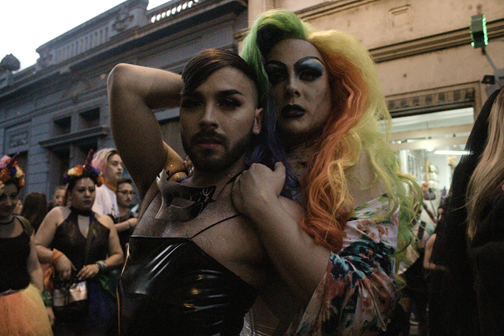
What follows is a guest post by Wesley D. Cray, Associate Professor of Philosophy at Texas Christian University.
The Real Joy of Working from Home
Like so many people, I was stuck working from home throughout most of the past year. Unlike almost all of the educators I know, I absolutely loved it. Sure, there were the obvious and perhaps widely relatable advantages: no time spent commuting, always home to catch the FedEx delivery person, having the luxury of teaching with my dogs snoring at my feet and a kitten purring in my lap. Those were certainly all welcome perks, but for me the greatest benefit was that, every day when I went to work, I got to dress like myself.
In a relatively recent piece at Aesthetics for Birds, philosopher Marilynn Johnson discusses the relation between adornment and meaning. Often times, whether it is our intention or not, what we wear signals information to others around us. This information might be genuinely informative, or it might be misleading. Considering the typical uniform of a Target employee, Johnson writes:
A red shirt and khakis is a sort of code in the sense that Target workers wear this combination of garments when they are working at the store. But perhaps you have had the experience of walking into a Target and realizing that you were dressed like a Target worker. What a surprise to suddenly find yourself in an environment where people are asking you to help with their shopping. You might realize that anyone who sees you will think that you work there but that is not what you had meant by putting on those clothes that morning.
Those of us with non-binary gender identities will perhaps be familiar with our own—likely difficult, perhaps sad, perhaps frightening—versions of this example. Leaving the house in my preferred, conventionally feminine-coded attire inevitably sends messages to those around me. And all too often, those messages are interpreted through a framework of cisnormativity, which I have elsewhere described as the ideology according to which ”the default way of being human involves a ‘match’ between binary gender identity and gender assigned at birth, and that any other way of being is in some way deviant, delusional, defective, or deficient.” My intuitive and comfortable way of moving through and presenting myself to the world, then, all too often invokes the judgment that I am in some way less than or other. Sometimes this leads only to a low-ish level of anxiety; other times it leads to the very real fear of physical harm.

(2020, Pocket Change Collective/Penguin Workshop)
In their short book Beyond the Gender Binary, poet and activist Alok Vaid-Menon gets right to this point: “{t}he reality that many gender non-conforming people cannot go outside without fear of being attacked is unacceptable.” In a particularly moving—and relatable—passage, Vaid-Menon explains:
The thing about being visibly gender non-conforming is that we are rarely, if ever, defended by other people in public. Everyone thinks that since we “made a choice” to “look like that,” we are bringing it upon ourselves. The only reason people can fathom why we would look this way is because we want to draw attention to ourselves. They can’t even consider that maybe we look like this for ourselves, and not for other people. We are reduced to a spectacle. And when you are a spectacle, the harassment you experience becomes part of the show.
This is why I was so thankful to work from home. Like unfortunately many work environments, my own—a fairly typical, if conservative-leaning medium-sized college campus located in north Texas—is ripe with the aforementioned cisnormativity. And cisnormativity is fertile soil for transphobia. Working virtually from home is one thing, but were I to walk onto my physical campus in a dress and heels, I would certainly draw attention. In the eyes of many—I’d guess most—I’d be seen as engaged in some variety of activism or performance, rather than just being dressed in accordance with my own standards of professionalism. As Vaid-Menon powerfully asserts: “I do not have the luxury of being. I am only seen as doing” (my italics)—with the harassment almost certainly not foo far behind.
Being and Doing
Perhaps under the influence of philosophers such as Jean-Paul Sartre and Judith Butler, I am inclined to think of doing and being as intimately connected. It’s not just the trans and non-binary persons out there who are performing, enacting, or otherwise doing their gender—it’s everyone. Insofar as we are always performing various roles and personas, we’re all being and doing all sorts of things, all the time. The luxury afforded to cisgender, gender-conforming persons—some much more than others, but as a whole far more than is ever afforded to trans and non-binary communities—isn’t quite that they get a break from all the doing. Instead, it’s that their doing is often considered inoffensive enough to draw neither comment nor concern—or at least eligible to be considered inoffensive enough. Such folk are indeed both being and doing, but the doing is largely ignored as long as they are doing it right—that is, as long as they swim along with the cisnormative current.
Those with visibly trans, non-binary, and gender-noncomforming identities are seen as doing it wrong. Fundamentally, our gender identities are existential threats to a system obsessed with binary gender ideology; our gender expressions are expressions of those threats. Along these lines, philosopher Robin Dembroff writes:
I consider nonbinary identity to be an unabashedly political identity. It is for anyone who wishes to wield self-understanding in service of dismantling a mandatory, self-reproducing gender system that strictly controls what we can do and be. As the philosopher Kate Manne puts it in her book Down Girl, this system rewards and valorizes those who conform to binary gender expectations, and punishes and polices those who do not. To be nonbinary is to set one’s existence in opposition to this system at its conceptual core.
I agree with Dembroff. As gender-nonconforming persons, our identities are inherently political. This is not because we overtly intend them to be so, but because our ways of being and moving through the world inevitably challenge the established binary gender ideology. Since that ideology is political, challenges to it are political, too.
Just as gender categories are socially constructed, so too can they be socially destroyed: “the more sledgehammers we take to gender categories,” Dembroff writes, “the better.” They invoke Riki Wilchins’s conception of “gender trash,” which also calls to mind Christopher Lonc’s similarly irreverent “genderfuck,” coined in his 1974 article “Genderfuck and Its Delights,” published in a 1974 issue of Gay Sunshine magazine. There, Lonc writes: “I want to criticize and poke fun at the roles of women and of men too. I want to try and show how not-normal I can be. I want to ridicule and destroy the whole cosmology of restrictive sex roles and sexual identification.”
On my reading, to genderfuck is not exactly to say fuck gender, per se. Instead, it’s to say: fuck cisnormativity. On bodies like mine, in neighborhoods like mine, a dress and a skirt undergo a sort of political transubstantiation: they become Dembroff’s sledgehammer.

Cisnormativity Sucks
I’ll be returning to my campus in the fall, for in-person teaching. (In fact, I’ll be returning the day after I submit the final version of this article.) Walking from my car to my classroom in a dress and heels, baking in the increasingly obnoxious Texas heat, many will likely see me as carrying that sledgehammer. Eyebrows will be raised, and I get it: I’d have questions about someone casually walking around with an implement of destruction, too. Without any context for why they’re carrying it, I’d likely avoid them. And, as much as I hate to admit it, I’d probably judge them, too.
It’s only in a cisnormative context, though, that my dress and heels become that sledgehammer. Were the cisnormativity to be magically zapped away, they’d return to being just bits of pretty, elegant adornment. Rather than wait on magical forces to save us, though, the relatively privileged among us gender trash—those of us who are, say, white, able-bodied, and financially stable, with supportive networks of friends and families—might opt in to carrying the sledgehammer, with the idea that each time we wield it, we get just a little bit closer to smashing the nonsense notion that people like us are doing it wrong. (And, make note, cisgender readers: you can wield those sledgehammers, too.)
I won’t argue here that we might have particularly moral reasons to genderfuck. I save that argument for an article forthcoming in the Journal of Aesthetics and Art Criticism as part of a symposium on Stephen Davies’s recent book, Adornment: What Self-Decoration Tells Us About Who We Are. Instead, I want to take a different approach: putting aside whether or not it is morally virtuous, I’ll instead make the case that genderfucking is simply awesome. After all, as philosopher Nick Riggle writes in On Being Awesome: A Unified Theory of How Not to Suck:
…The problem is that the thought of being virtuous or dutiful out of a love of virtue or duty doesn’t really stoke the twenty-first-century ethical imagination. But the thought of being awesome out of a love of awesomeness does. At the end of the day, what we ultimately want is to not suck. More than that: We want to be awesome.
There is great wisdom in this passage. Increasingly, it seems that people are not only unmotivated by talk of “morality” and “duty,” but perhaps even a bit turned off or away by it. Saying of their behavior “that’s immoral!” is likely to garner an eye roll, or worse. But telling them that their behavior sucks? That tends to get attention. That’s effective.
On Riggle’s account, to be awesome is to be invested in creating, contributing to, and sustaining a culture centered around the mutual appreciation of individuality. Awesomeness allows—encourages—joyful and constructive expressions of the self through deviation from norms and creative departures from social scripts. Awesome persons lead by example, not just bucking conventions to express themselves but also creating and nourishing space for others to do so, too.
To resist awesomeness, on the other hand, is to enforce suckiness. Suckiness discourages joyful and constructive expressions of the self, reifying and deifying norms and social scripts. It polices expression and locks the doors to spaces of authentic and creative free-play. In Riggleian terms, suckiness and sucky people suck the life out of life, like some sinister, sentient shop-vac hellbent on upholding conformity. It’s no wonder that people tend to listen up when you tell them that their behavior kind of sucks.
Cisnormativity sucks. As I discussed in another recent piece: cisnormative culture sucks, and cisnormative spaces suck, too. Such culture and such spaces restrict what even cisgender persons can do to authentically, creatively, constructively, and playfully express themselves. When it comes to trans, non-binary, and gender-nonconforming persons, that restriction becomes an elimination. For the cis, cisnormativity is an all-encompassing prison of suckiness, while the rest of us gender trash get thrown into maximum security—sometimes even solitary.
Awesomeness for All
Among philosophers of art in the analytic tradition, there is recently somewhat of a renewed interest in the topic of bodily adornment. There is much potential, too, for such philosophers to further dive into and engage with issues of gender and gender-based oppression.
Standing at the intersection of these topics, and informed by Riggle’s account of awesomeness as a particularly potent aesthetico-ethical virtue, we can see the liberatory potential of wielding adornment as a sledgehammer against cisnormative suckiness. Of course, there is much work to do, as that suckiness runs deep. Dembroff (2018) writes:
What I do know is that our gender systems are not only broken, but that they never worked. For binary and nonbinary folks alike, they damage mental and physical health, promote economic inequality, and fuel sexual and other gendered violence. For my gender trash kin, and especially persons of color, they make life into a tightrope where one misstep or just bad luck ends in unemployment, harassment, rape, beatings or even death. We must continue to question a culture that mandates infants’ genitals be coded according to a binary that determines much of their lives.
Me wearing a dress and heels to a conservative college campus in north Texas isn’t going to stop gender-based violence. An army of us doing the same wouldn’t, either. But dismantling systems of oppression requires complex strategies, and complex strategies have multitudes of component parts. Whether you’re gender trash like me or cis, overt or even subtle acts of adornment-based rebellion against cisnormative suckiness contribute to the cumulative effort to make the world safer for trans folk, non-binary folk, gender-nonconforming folk, and—given the insidious reach of cisnormativity—even cisgender folk. In the struggle to create and sustain a culture of mutual appreciation of authentic, creative, and playful individual expression, we need all the help we can get. This fall term, I’ll be playing my small part, so that hopefully, before too long, my dress and heels can de-transubstantiate and really be just a dress and heels.
In conclusion: genderfucking is awesome. I encourage you to try it.

Photo by Juan Pajaro Valesquez (via Wikipedia Commons)
Wesley D. Cray (they/them) is Associate Professor of Philosophy at Texas Christian University. Their work has appeared in American Philosophical Quarterly, Australasian Journal of Philosophy, British Journal of Aesthetics, Contemporary Aesthetics, Journal of Aesthetics and Art Criticism, Journal of the American Philosophical Association, and elsewhere, including the newly launched queer literary arts and fashion magazine, Just Femme and Dandy. Their book, Philosophy of Comics: An Introduction (co-authored with Sam Cowling) is currently under contract with Bloomsbury. In addition to their academic work, Ley also serves as an LGBTQIA+ consultant and yoga and mindfulness instructor in clinical contexts, and leads monthly yoga practices for trans, non-binary, and gender-nonconforming persons in the Dallas-Fort Worth area. You can read more about their work here.



October 8, 2021 at 4:30 pm
Love this. One easy way to genderfuck for the cismales among us: paint your nails! Cheap, fun, disturbs all the right people, looks great. You can start with black and then graduate to more colourful stuff… worked for me.